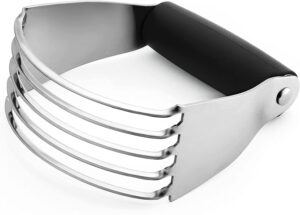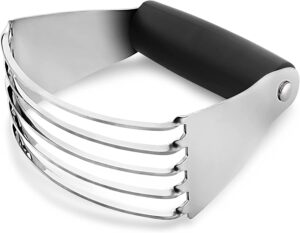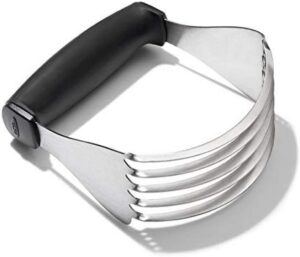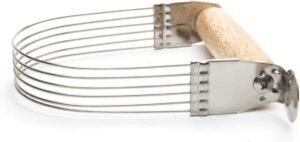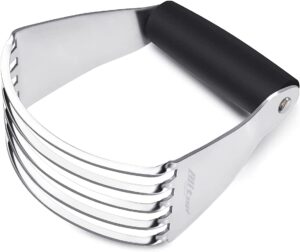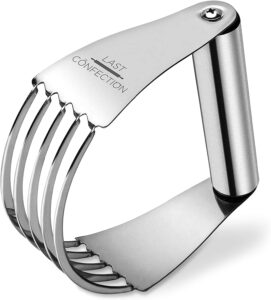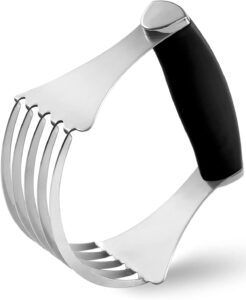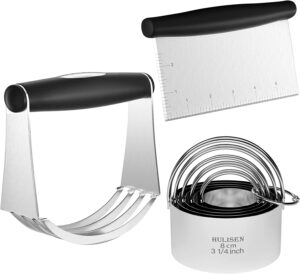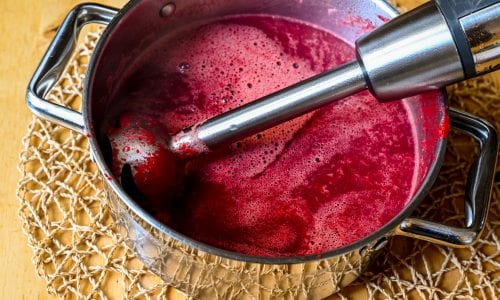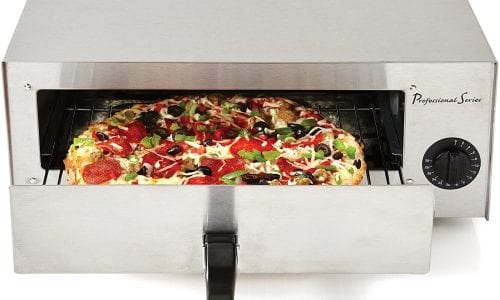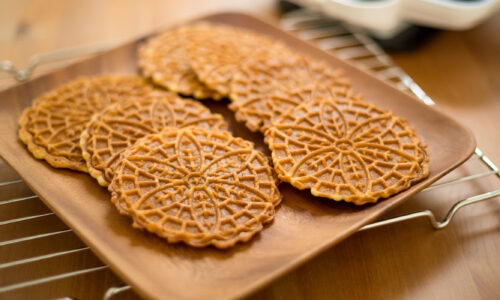The Best Dough Blender

Our Review Process
Don't Waste Your Money is focused on helping you make the best purchasing decision. Our team of experts spends hundreds of hours analyzing, testing, and researching products so you don't have to. Learn more.
Our Picks For The Top Dough Blenders
- 1. Spring Chef Heavy Duty Stainless Steel Dough Blender
- 2. Zulay Kitchen Dishwasher Safe Steel Dough Blender
- 3. OXO Good Grips Non-Slip Handle Dough Blender
- 4. ALLTOP Rust-Resistant Steel Blades Dough Blender
- 5. Fox Run Stainless Steel Wires Dough Blender
- 6. Chef Pomodoro Non-Slip Contoured Grip Dough Blender
- 7. LAST CONFECTION Lightweight Stainless Steel Dough Blender
- 8. GiFBERA Non-Slip Ergonomic Handle Dough Blender
- 9. HUINF Round Cookie Cutters & Dough Blender, 6-Piece
- 10. HULISEN Steel Pastry Tools & Dough Blender, 3-Piece
This dough blender features five blades that are thicker than other blenders, making it extra sturdy. Despite the added thickness, the dough blender remains lightweight and easy to use.
Sturdy Blades For Versatility Whether you wish to utilize it for baking or cooking, this dough blender’s thicker blades make a more versatile kitchen utensil.
This dough blender is equipped with a soft, comfortable rubber handle, easing the pressure placed on your hand. Its added comfort lets you use the blender for extended periods of time and on more ingredients.
A Comfortable, Soft GripWhile it’s perfect for dough, this blender can be used on a variety of ingredients, from nuts to fruits.
Accidents happen in the kitchen; however, this blender’s non-slip handle minimizes the chances. When combined with the handle’s broad design, this dough blender is suitable for a variety of hands.
So Easy to HoldThis dough blender’s accessible design streamlines baking and produces flakier dough.
This dough blender includes a wooden handle, giving it a rustic appearance, perfect for country home decor. The handle even has a thumb rest for added convenience.
Stylish, Rustic DesignThis dough blender artfully combines practicality with sophistication, producing beautifully blended dough in style.
Buying Guide
Dough blenders, commonly referred to as pastry cutters or pastry blenders, are kitchen tools most often used in baking. It is designed to cut fat into flour, creating clumps that produce flaky biscuits, buttery pie dough and other pastries when baked.
A dough blender is a U-shaped tool with a top handle connected to four to five relatively dull blades. With a firm grip on the handle, the dough blender is pressed into the butter and flour mixture, creating lumps in the dough. These lumps are what give a variety of pastries a flaky texture once baked.
Dough blenders may also vary in blade quantity and thickness. While these variances may not make a significant difference when baking, they can affect the blender’s ability to apply to other ingredients.
Some dough blenders can be used to chop nuts and fruits in addition to their dough applications. It’s important to research whether the dough blender is sturdy enough for these applications, especially when chopping nuts since they are tougher ingredients.
Remember, dough blender blades are not as sharp as a knife’s, so they are not interchangeable.
Other differences in dough blenders fall under the aesthetic umbrella. While color and style may not influence the blender’s effectiveness, they can often be the deciding factor when choosing a blender.
When shopping for a dough blender, the most important thing to consider is the size of the handle. While most dough blenders are designed as one-size-fits-all to accommodate most hand sizes, larger blenders are available if needed.
What to Look For
- Consider which handle size is the most comfortable to use.
- Dough blenders feature a variety of handle types, so try out a few to determine which is the most comfortable.
- Never place a dough blender in the dishwasher unless deemed dishwasher-safe.
- Only use a dough blender to cut nuts or other ingredients if it’s sturdy enough.
- Cut the fat into the flour with a rolling movement to achieve the best results when using a dough blender.
- Always hold dough blenders by the designated handle.
- While dough blender blades are not particularly sharp, always use them with caution.
More to Explore
Dough blenders have been used for centuries to produce buttery and flaky pastry dough. Historically, it was predominately used when making pie crust; however, its applications have expanded to all kinds of pastries and baked goods.
Pastries have a long history and have existed throughout many cultures. Early pie crusts, in which the process of cutting fat into flour was used, have medieval roots. The earliest English language cookbook, called Forme of Cury, refers to early pies and tarts as chastletes and coffins.
Today, dough blenders are loved because they create the needed effect of flaky dough while keeping your hands clean.

